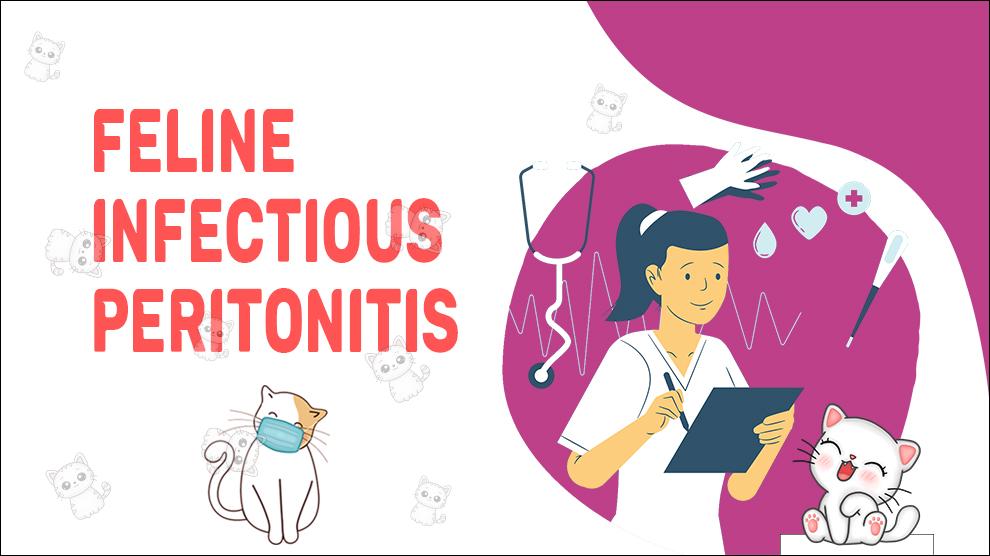What Is Feline Infectious Peritonitis?
Feline Infectious Peritonitis (FIP) is a viral disease that affects cats.
It is caused by a type of coronavirus that mutates and becomes virulent in some cats, leading to the development of the disease.
FIP can affect cats of all ages, but it is more common in cats that are under two years of age or over ten years of age.
The disease is often fatal, with a survival time of only a few weeks to a few months after diagnosis.
Clinical Signs Of Feline Infectious Peritonitis
The symptoms of FIP can be quite varied and depend on the form of the disease.
There are two forms of FIP:
The wet form and the dry form.
The wet form of FIP is characterized by the accumulation of fluid in the abdomen and/or chest.
Symptoms of the wet form include:
- Weight loss
- Lethargy
- Loss of appetite
- Difficulty breathing
- Abdominal swelling
- Yellowing of the skin and/or eyes (jaundice)
- Anemia
The dry form of FIP is characterized by the formation of granulomas, or small nodules, in various organs of the body.
Symptoms of the dry form include:
- Weight loss
- Lethargy
- Loss of appetite
- Fever
- Depression
- Eye problems
- Neurological symptoms, such as seizures or difficulty walking
Treatment Options For Feline Infectious Peritonitis
Unfortunately, there is no cure for Feline Infectious Peritonitis, and it is considered a fatal disease.
Treatment options are aimed at providing supportive care and reducing the severity of symptoms to improve the cat's quality of life.
Treatment options may include:
- Corticosteroids: These drugs can help reduce inflammation and relieve some symptoms. However, they should only be used under a veterinarian's supervision due to potential side effects.
- Fluid therapy: Intravenous fluids may be given to cats to maintain their hydration and electrolyte balance.
- Nutritional support: Cats with FIP may lose their appetite, and nutritional support may be necessary to prevent malnutrition. In some cases, a feeding tube may be required to provide adequate nutrition.
- Antiviral drugs: Antiviral drugs may be used to treat cats with FIP. However, the effectiveness of these drugs is still under debate, and they may not be effective in all cases.
- Immunomodulators: These drugs can help regulate the immune system and may be used in cats with FIP to reduce inflammation and improve clinical signs.
Home Remedies For Feline Infectious Peritonitis
There are no home remedies or specific diets that can cure or prevent Feline Infectious Peritonitis.
How To Prevent Feline Infectious Peritonitis?
Preventing Feline Infectious Peritonitis is difficult since the virus that causes the disease is common in cat populations.
However, there are several steps that cat owners can take to reduce their cat's risk of contracting the disease:
- Vaccination: While there is no vaccine that can prevent FIP, vaccines for other diseases, such as feline enteric coronavirus, may help reduce the risk of FIP.
- Isolation: Cats that have tested positive for feline enteric coronavirus should be isolated from other cats to prevent the spread of the virus.
- Hygiene: Regular cleaning and disinfecting of litter boxes, food bowls, and bedding can help reduce the spread of the virus.
- Testing: Testing cats for feline enteric coronavirus can help identify cats that may be at risk for developing FIP.
Affected Cat Breeds Of Feline Infectious Peritonitis
All breeds of cats can be affected by Feline Infectious Peritonitis.
However, certain breeds, such as Persians and Himalayans, may be more susceptible to the disease.
Causes For Feline Infectious Peritonitis
Causes:
Feline Infectious Peritonitis is caused by a type of coronavirus that mutates and becomes virulent in some cats.
The virus is spread through contact with the feces or urine of infected cats.
The virus can also be spread through direct contact with an infected cat or through contact with contaminated objects, such as food dishes or litter boxes.
Cats that live in multi-cat households or in environments where they are in close contact with other cats are at a higher risk of contracting the virus.
When To See A Vet For Feline Infectious Peritonitis?
If you suspect that your cat may have Feline Infectious Peritonitis, it is important to seek veterinary care immediately.
Early diagnosis and treatment may help improve the cat's quality of life and prolong survival.
Food Suggestions For Feline Infectious Peritonitis
Providing your cat with a high-quality, balanced diet and maintaining a clean and stress-free environment can help support its overall health and immune system.
Conclusion
Feline Infectious Peritonitis is a complex and challenging disease that remains a significant concern for cat owners and veterinarians worldwide.
While there is currently no cure for the disease, early diagnosis, and supportive care can help improve a cat's quality of life and prolong survival.
Prevention measures, such as vaccination and hygiene, can also help reduce the risk of Feline Infectious Peritonitis.
Cat owners should be aware of the signs and symptoms of the disease and seek veterinary care immediately if they suspect their cat may be affected.











